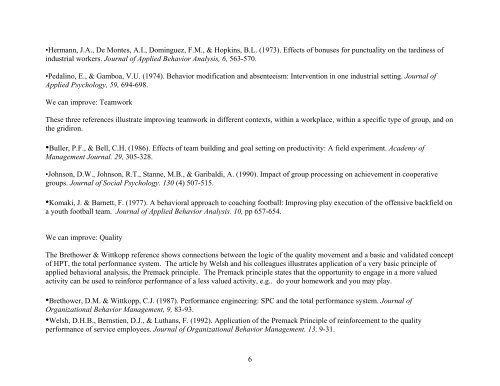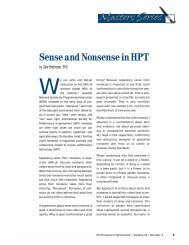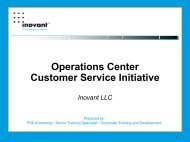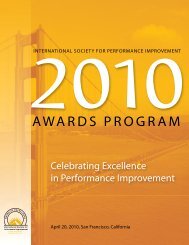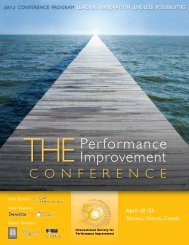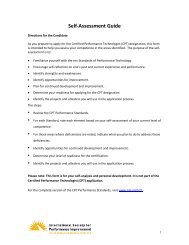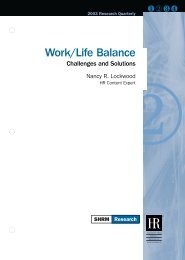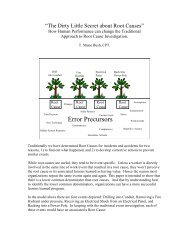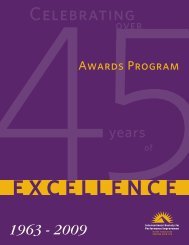Yes We Can! - International Society for Performance Improvement
Yes We Can! - International Society for Performance Improvement
Yes We Can! - International Society for Performance Improvement
Create successful ePaper yourself
Turn your PDF publications into a flip-book with our unique Google optimized e-Paper software.
•Hermann, J.A., De Montes, A.I., Dominguez, F.M., & Hopkins, B.L. (1973). Effects of bonuses <strong>for</strong> punctuality on the tardiness of<br />
industrial workers. Journal of Applied Behavior Analysis, 6, 563-570.<br />
•Pedalino, E., & Gamboa, V.U. (1974). Behavior modification and absenteeism: Intervention in one industrial setting. Journal of<br />
Applied Psychology, 59, 694-698.<br />
<strong>We</strong> can improve: Teamwork<br />
These three references illustrate improving teamwork in different contexts, within a workplace, within a specific type of group, and on<br />
the gridiron.<br />
•Buller, P.F., & Bell, C.H. (1986). Effects of team building and goal setting on productivity: A field experiment. Academy of<br />
Management Journal. 29, 305-328.<br />
•Johnson, D.W., Johnson, R.T., Stanne, M.B., & Garibaldi, A. (1990). Impact of group processing on achievement in cooperative<br />
groups. Journal of Social Psychology. 130 (4) 507-515.<br />
•Komaki, J. & Barnett, F. (1977). A behavioral approach to coaching football: Improving play execution of the offensive backfield on<br />
a youth football team. Journal of Applied Behavior Analysis. 10, pp 657-654.<br />
<strong>We</strong> can improve: Quality<br />
The Brethower & Wittkopp reference shows connections between the logic of the quality movement and a basic and validated concept<br />
of HPT, the total per<strong>for</strong>mance system. The article by <strong>We</strong>lsh and his colleagues illustrates application of a very basic principle of<br />
applied behavioral analysis, the Premack principle. The Premack principle states that the opportunity to engage in a more valued<br />
activity can be used to rein<strong>for</strong>ce per<strong>for</strong>mance of a less valued activity, e.g.. do your homework and you may play.<br />
•Brethower, D.M. & Wittkopp, C.J. (1987). Per<strong>for</strong>mance engineering: SPC and the total per<strong>for</strong>mance system. Journal of<br />
Organizational Behavior Management, 9, 83-93.<br />
•<strong>We</strong>lsh, D.H.B., Bernstien, D.J., & Luthans, F. (1992). Application of the Premack Principle of rein<strong>for</strong>cement to the quality<br />
per<strong>for</strong>mance of service employees. Journal of Organizational Behavior Management. 13, 9-31.<br />
6


